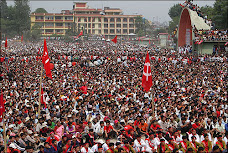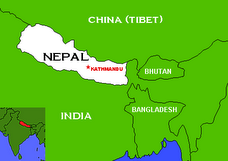

The White House, the centre of world capitalism, has not always been an enemy of the Maoist world। In one of the eventful eras of US politics, former US President Nixon triggered a series of shocks, known as 'Nixon shocks,' in US history. One such shock was his dramatic visit to China and recognition of Mao's regime. This took place at a time when the whole western block was hostile and refused to recognise Red China. After Nixon's visit, the world's leaders beat a path to Mao's door.Cold WarAgainst the backdrop of worsening Sino-Soviet relations, Nixon wanted to balance the Cold War by wooing Mao. On the other hand, Mao wanted to re-launch himself on the international stage by rolling a red carpet for Nixon. However, their meeting did not happen so simply. In the beginning, both the sides were very aware about their images and did not want to be seen as courting each other. But it was Mao's side that broke the ice. In November 1970, Zhou En-Lai sent a message through the Romanians, who had good relations with both China and the US, saying that Nixon would be welcome in Beijng. The White House responded very carefully. It made no reference to a presidential visit, thinking that the idea would be 'premature and potentially embarrassing.' As the issue of a visit did not gain momentum, one event that took place in the sport sector gave a new twist to the scenario. In March, China sent a table tennis team to Japan for the world championship. In an interesting development, a US player got on a Chinese bus and shook hands and talked to a Chinese player. The US player expressed his desire to come to China to participate in a sport event. Mao first turned down the US request. After many deliberations, he phoned the Foreign Ministry at midnight to invite the US team.The news caused a sensation in the world. The American and western media made fascinating reports on it on a daily basis. "Nixon," wrote a commentator, "was truly amazed at how the story jumped off the sports pages and onto the front pages."The ping-pong diplomacy of Mao captivated Nixon. In his memoir, his Security Advisor Henry Kissinger wrote, "Nixon was excited to the point of euphoria. He wanted to skip the emissary stage lest it take the glow off his own journey." By the end of May, it was settled, in secret, that Nixon would go to China.By inviting Nixon, Mao got many things. The US abandoned its old ally Taiwan and offered China a permanent Security Council seat at the UN with veto power. It was fixed during the behind-the-scene meeting between Kissinger and Zhou. The US made a huge commitment to pull all forces out of Indochina and Korea. Kissinger also agreed to give sensitive information on Russia to China. Mao even floated the idea of forging a Sino-US alliance against the Soviet Union to obtain sophisticate military technology and boost China's aircraft industry and superpower programme.At the meeting, Nixon told Mao, "The Chairman's writings moved a nation and have changed the world." But a clever Mao manipulated Nixon's visit in a way that he continued to be seen as an anti-American champion in the world. However, Nixon was not a loser. At home, the American people praised him for opening a door to China and trying to bring the Vietnam war to an end. He was paid off in his second-term presidential win by a huge margin. Until he was disgraced and forced to resign as president over his role in the 'Watergate scandal,' he remained a successful Republican President. Almost three-and-a-half-decades later, President George W. Bush of Nixon's party has refused to recognise the CPN-Maoist of Prachanda who has followed Mao's doctrine to seize power using guerrilla warfare tactics. Nixon's man is ignoring Mao's disciple. May be that the Nepali Maoists do not hold as strategic an importance as Mao who completely tamed his enemy and ruled a colossal China. On the other hand, Prachanda has won the insurgency only by half. He could not bust the powers of his enemy. By courting Mao, Nixon challenged Kremlin that resulted in the singing of the Strategic Arms Limitation Treaty (SALT).The White House often cites Maoist violent activities as a factor to put the terrorist tag on them. Comparing the atrocities of the Nepali Maoists to Mao's excesses seen during the Cultural Revolution, the Great Purge and in crushing his long-time comrades, the former tend to be less ruthless. Going by the statements of Maoist leaders, Nepal holds strategic value for the US because of its geo-political location. Dr. Babu Ram Bhattarai, a Maoist ideologue, talking to this author, claimed that the US is keeping an eye on the rising Asian super powers - China and India - by consolidating its position in Nepal. Whatever the intention of the US in treating the Maoists as terrorists, its policy towards the Nepali Maoists might create a new diplomatic paradigm. China is now in search of a reliable force in Nepal after the monarchy, its long-time trustworthy ally who is struggling for survival. Communist China always considered the king a reliable force in keeping its territorial interests intact. It is said that Chairman Mao had suggested that the Nepali communists work with king against the backdrop of Chinese hostility to India. Silent diplomacyGrowing Chinese interest in the Nepali peace process and the visit of a top Maoist commander to China is an indication that China will no more maintain silent diplomacy here. And the America's continued hard posture towards the Maoists will only give birth to another ally against it in the region.
Source: The Rising Nepal



No comments:
Post a Comment